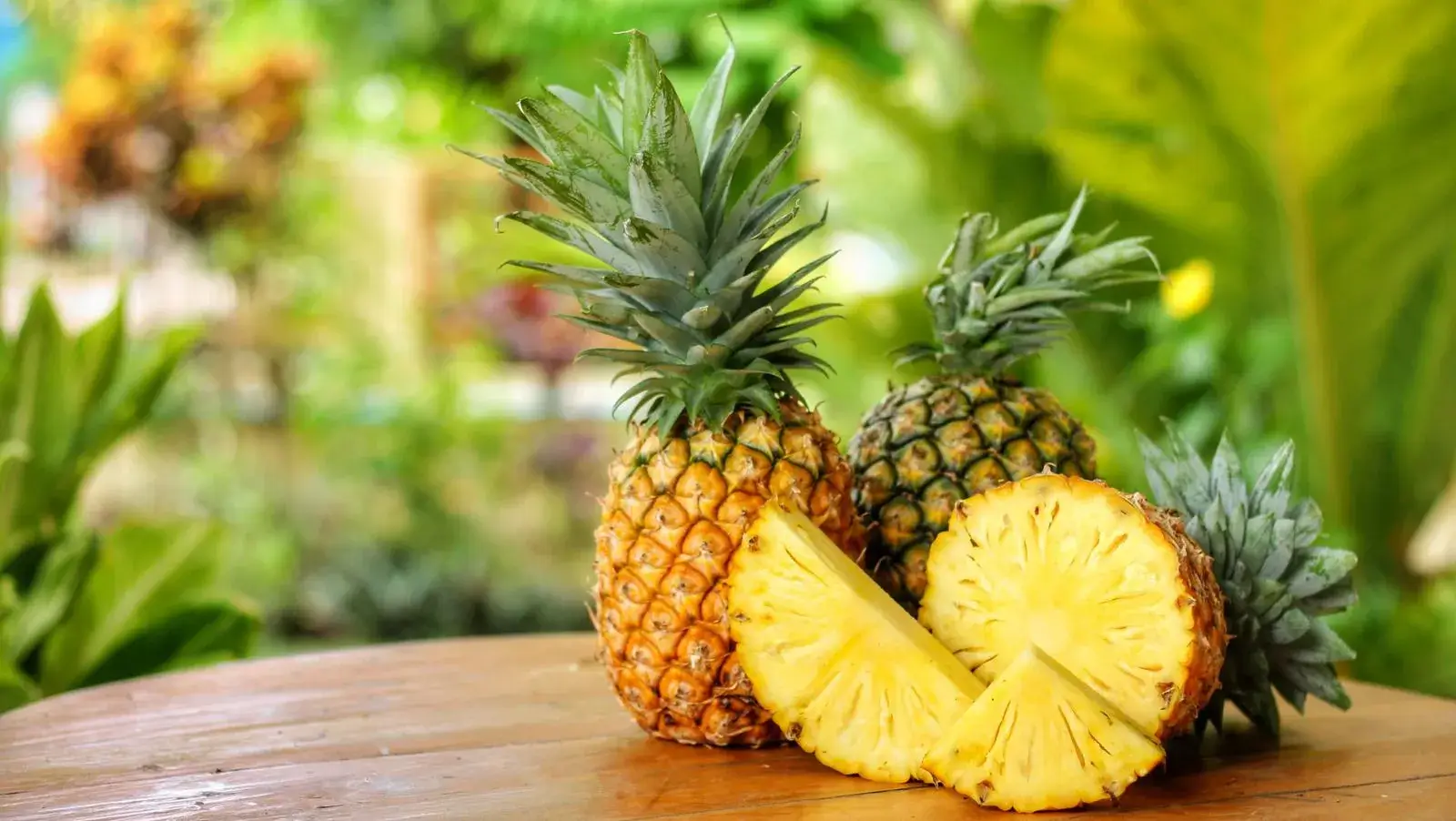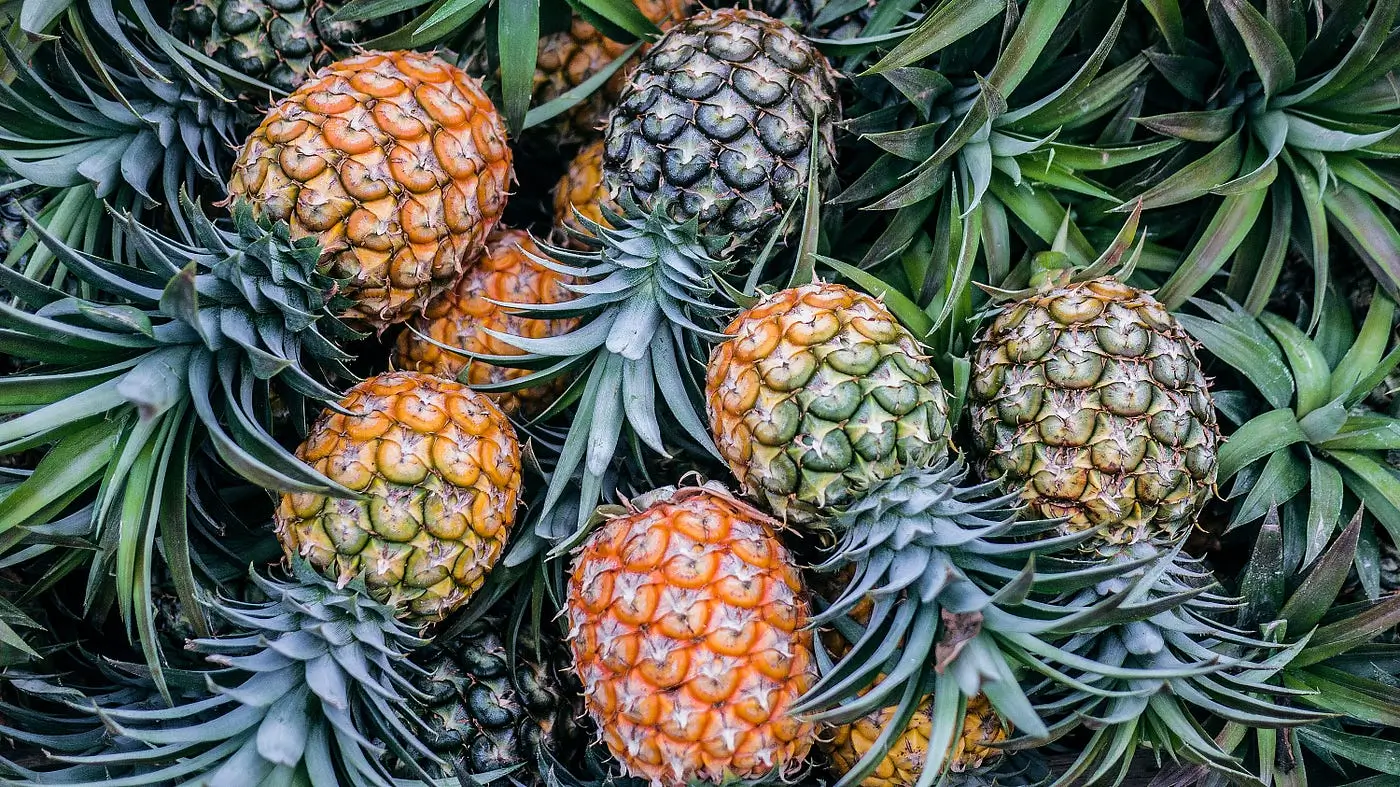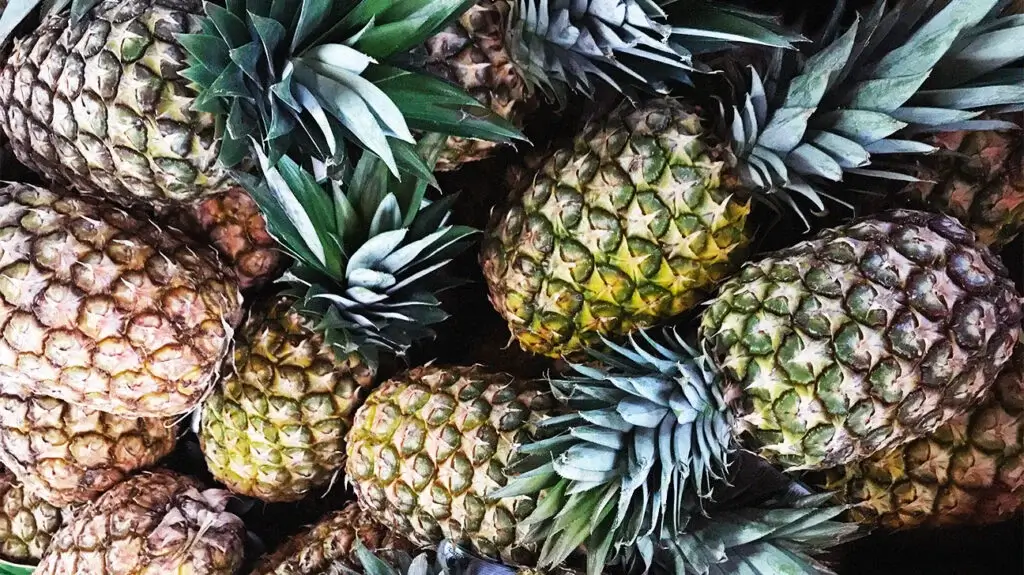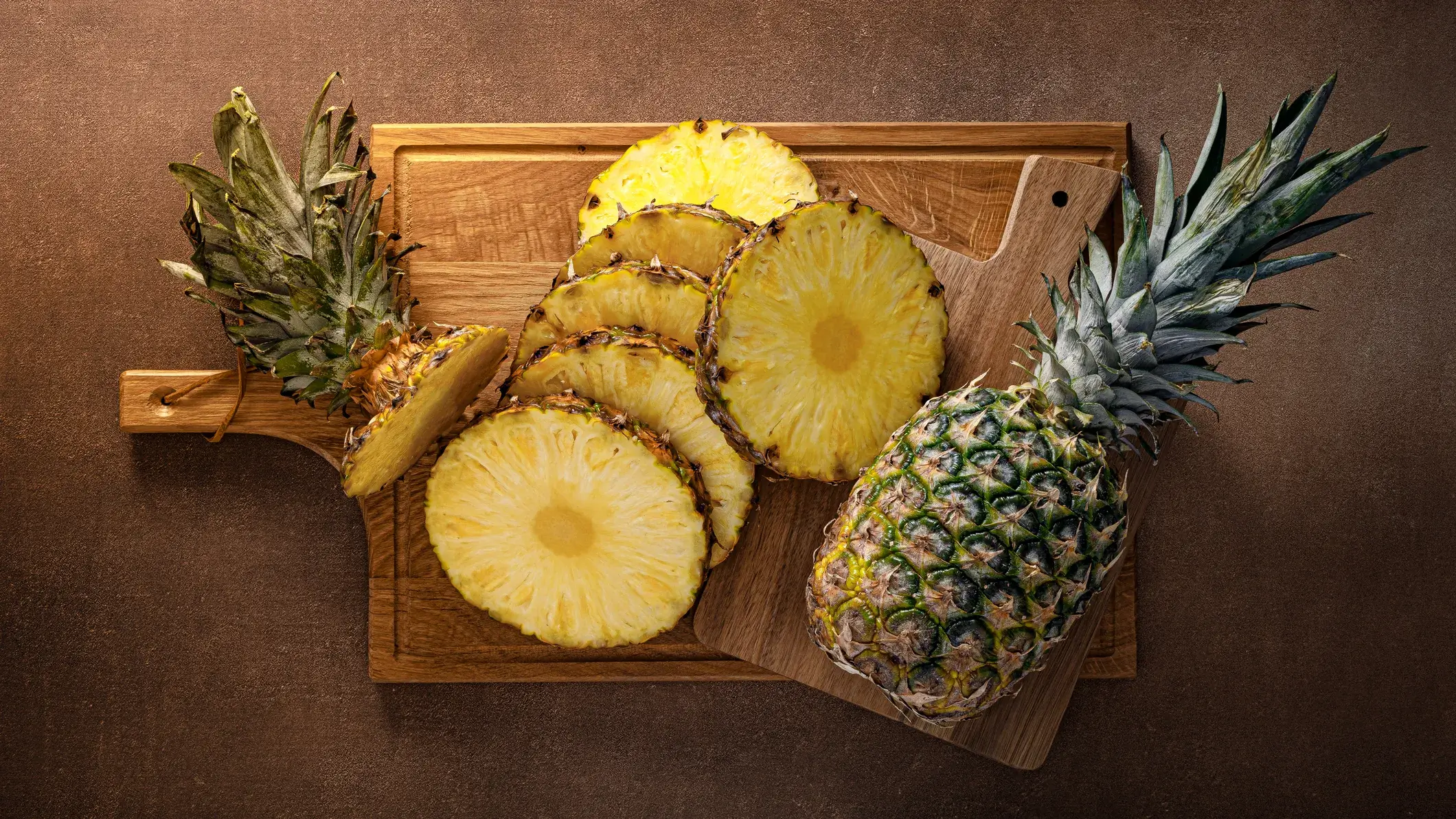When it comes to tropical fruits, pineapple reigns supreme. Its sweet, tangy taste and vibrant yellow color make it a favorite in many households. But is pineapple good for you?
Absolutely! This juicy fruit isn’t just a treat for your taste buds; it’s also a powerhouse of nutrients that can significantly boost your health.
Is Pineapple Good for You?
In short, yes, pineapple is incredibly good for you. It’s packed with essential vitamins, minerals, and unique compounds that offer a wide range of health benefits.
From supporting your immune system to helping with weight loss, this tropical delight has got you covered.
Nutritional Facts of Pineapple
Before we dive into the health benefits, let’s take a closer look at what makes pineapple a nutritional superstar.
You’d be surprised at how much goodness is packed into each juicy slice!

Essential Vitamins and Minerals
I’m always on the lookout for foods that give me the most bang for my buck, nutritionally speaking.
And let me tell you, pineapple doesn’t disappoint! Just one cup (about 165 grams) of pineapple chunks is loaded with:
- Vitamin C: A whopping 88% of your daily value (DV)! That’s more than oranges, folks.
- Manganese: An impressive 109% DV for women and 66% DV for men.
- Vitamin B6: 11% DV, supporting brain health.
- Copper: 20% DV, crucial for forming red blood cells.
- Thiamine (B1): 11% DV, helps convert food into energy.
But wait, there’s more! Pineapples also offer good amounts of vitamins A and K, potassium, magnesium, and folate. It’s like a multivitamin in fruit form!
Fiber for Digestive Health
I can’t stress enough how important fiber is for our gut health. Pineapple comes through again, providing about 2.3 grams of fiber per cup.
This helps keep things moving smoothly in your digestive tract, preventing issues like constipation.
Bromelain: The Secret Weapon
Now, here’s where pineapple truly shines. It contains a unique enzyme called bromelain that you won’t find in many other foods.

Bromelain is a group of enzymes that break down proteins, which is why pineapple is often used as a meat tenderizer. But its benefits go way beyond the kitchen!
Let’s geek out about bromelain for a moment.
This isn’t just any enzyme; it’s a complex mixture of proteases, or protein-digesting enzymes, primarily found in pineapple stems. Its name comes from “Bromelia,” the family of plants to which the pineapple belongs.
When you consume bromelain, it works its magic in two main ways:
- Anti-Inflammatory Action: Bromelain inhibits the production of pro-inflammatory molecules like cytokines and prostaglandins. A 2023 study found that bromelain significantly reduced inflammation in animal models, suggesting its potential in treating inflammatory diseases.
- Protein Digestion: As a protease, bromelain breaks down complex proteins into simpler amino acids. This not only helps tenderize meat but also aids your body in digesting proteins more efficiently, reducing bloating and discomfort.
Beyond these, some research suggests bromelain might help in cancer treatment.
A study showed that bromelain could induce cell death in certain breast cancer cells. While more human studies are needed, it’s an exciting area of research!
10 Surprising Health Benefits of Pineapple
Alright, now that we know what’s inside this tropical gem, let’s explore how it can boost your health.

Trust me; some of these benefits will make you want to add pineapple to every meal!
Boosts Your Immune System
In today’s world, keeping our immune system strong is more important than ever. With its sky-high vitamin C content, pineapple is your ally in this fight.
Vitamin C stimulates the production of white blood cells, your body’s frontline defenders against infections.
I make it a point to enjoy some pineapple whenever I feel a cold coming on. It’s my go-to natural remedy, and more often than not, it helps me bounce back quickly.
Aids in Digestion
Have you ever felt bloated or uncomfortable after a heavy meal? Pineapple might be your new best friend.
Remember bromelain, that unique enzyme I mentioned? It’s a digestive powerhouse. By breaking down proteins more efficiently, it eases the workload on your digestive system.
I often enjoy a slice of pineapple after meals, especially when I’ve had something protein-rich like steak or chicken. It’s like giving my stomach a helping hand!
Reduces Inflammation
Chronic inflammation is at the root of many health issues, from arthritis to heart disease. Here’s where pineapple’s bromelain shines again.
It has potent anti-inflammatory properties that can help reduce swelling and pain.
I have a friend who struggles with osteoarthritis in her knees. She started eating more pineapple, and while it’s not a cure-all, she says it noticeably eases her discomfort.
Supports Weight Loss
Trying to shed a few pounds?
Make pineapple your weight-loss buddy. It’s low in calories but high in fiber, which means it fills you up without weighing you down.

One cup has only about 82 calories—that’s a guilt-free snack if I ever saw one!
During my weight loss journey, I’d often reach for pineapple when sugar cravings hit. Its natural sweetness satisfied my sweet tooth without derailing my progress.
Promotes Healthy Skin
Who doesn’t want radiant, youthful skin? Pineapple’s vitamin C is a skincare superstar. It’s essential for producing collagen, the protein that keeps your skin firm and elastic.
Plus, its antioxidants fight off free radicals that can lead to premature aging.
I’ve noticed that when I eat more pineapple, my skin has a brighter, more vibrant look. It’s like getting a mini facial from the inside out!
May Help Prevent Cancer
Now, this is a big one. While more research is needed, early studies suggest that the bromelain and antioxidants in pineapple may help prevent certain types of cancer.
They work by neutralizing harmful free radicals and potentially slowing the growth of cancer cells.
Speeds Up Recovery
Are you an athlete or just someone who loves a good workout? Pineapple can be your post-exercise buddy.
Its anti-inflammatory properties help reduce muscle soreness and joint pain after intense physical activity.
I’m no pro athlete, but I do enjoy my weekend hikes. A pineapple smoothie after a tough trail always seems to make my muscles feel better the next day.
Enhances Heart Health
Heart disease is a major concern for many, but pineapple might offer some protection.

Its bromelain may help break down blood clots and lower cholesterol deposits, promoting healthier blood flow. The potassium in pineapple also helps regulate blood pressure.
Alleviates Cold and Allergy Symptoms
Stuffy nose? Scratchy throat?
Before you reach for the medicine cabinet, try some pineapple. Its bromelain can help thin out mucus, making it easier to expel.
Plus, its anti-inflammatory effects may reduce swelling in your nasal passages.
Last spring, when my allergies were in full swing, I started drinking pineapple juice daily. It didn’t cure my allergies, but it made breathing easier!
Great for Men’s Health
Guys, listen up! Pineapple has some unique benefits just for you. Its high manganese content supports bone health and testosterone production.
Some studies even suggest that bromelain might help with certain male reproductive issues.
Creative Ways to Enjoy Pineapple
Now that you’re convinced pineapple is good for you, let’s talk about how to enjoy it.

There’s more to this fruit than just eating it straight (though that’s delicious too!).
- Grilled Pineapple: Brush with a bit of honey and grill for a caramelized treat. Perfect with pork or chicken.
- Pineapple Salsa: Dice it up with red onion, jalapeño, and cilantro for a zesty taco topping.
- Smoothies: Blend with coconut water, spinach, and banana for a tropical green smoothie.
- Pineapple Fried Rice: Add chunks to your stir-fry for a sweet-savory twist.
- Frozen Pineapple: Pop some in the freezer for a refreshing, ice cream-like snack.
Side Effects of Pineapples
I’m all about transparency, so it’s only fair to mention that pineapple isn’t perfect for everyone.
Some folks might experience:
- Allergic Reactions: If you’re allergic to latex, you might also react to pineapple. The Mayo Clinic explains that certain proteins in latex are similar to those in pineapple, causing cross-reactivity.
- Mouth Irritation: The acids and bromelain can sometimes cause a tingling or burning sensation.
- Digestive Issues: Too much can lead to diarrhea or heartburn, especially in sensitive individuals.
- Drug Interactions: According to WebMD, bromelain may interact with certain blood thinners like warfarin and antiplatelet drugs. Always consult your doctor if you’re on medications.
These issues are generally rare and often occur only with excessive consumption. Most people can enjoy pineapple without any problems. Just listen to your body and enjoy it in moderation.
How Much Pineapple is Safe?
So, how much pineapple can you safely eat? While there’s no strict limit, moderation is key.
One to two cups (165-330 grams) of pineapple per day is generally safe for most people. This amount provides ample nutrients without overdoing it on sugar or bromelain.
If you have digestive sensitivities or are trying pineapple for the first time, start with half a cup and see how your body responds. Remember, it’s always better to introduce new foods gradually.
Choosing and Storing Your Pineapple
Ever stood in the produce section, squeezing pineapples and sniffing their bottoms? You’re not alone!
Here’s how to pick a winner:
- Color: Look for a golden-yellow color. Green pineapples are underripe.
- Smell: A ripe pineapple smells sweet at the base. No smell? It’s not ready.
- Firmness: It should be firm with a slight give when squeezed.
- Leaves: Fresh, green leaves are a good sign. Brown or dried out? Pass.
Once you’ve got your perfect pineapple, store it right:
- Room Temperature: If you’ll eat it within a day or two, counter storage is fine.
- Refrigerator: For longer storage, cut it up and keep it in an airtight container. It’ll last about 5-7 days.
- Freezer: Yes, you can freeze pineapple! Cut into chunks, lay flat on a tray to freeze, then transfer to a bag. Great for smoothies!
Sustainability and History
Before we wrap up, let’s talk about where your pineapple comes from. This tropical treasure is native to South America, specifically between southern Brazil and Paraguay. The Tupi-Guarani people were cultivating pineapples long before Europeans arrived.

Today, most pineapples come from Hawaii, Costa Rica, and the Philippines. But here’s the thing: conventional pineapple farming often involves heavy pesticide use.
If you can, opt for organic or certifications like Rainforest Alliance, which promotes more sustainable practices.
Conclusion
A Sweet Answer to “Is Pineapple Good for You?”
The resounding answer is YES! From boosting your immune system, aiding digestion, promoting heart health, and even helping with weight loss, this tropical fruit is a nutritional powerhouse.
Its unique enzyme, bromelain, sets it apart with anti-inflammatory and protein-digesting properties that are gaining attention in the medical community.
I’ve made pineapple a regular part of my diet, and I can honestly say I feel better for it. My digestion has improved, my skin looks brighter, and I seem to catch fewer colds. Plus, let’s be real—it’s just plain delicious!
Remember, while pineapple offers impressive health benefits, it’s not a magic cure-all. It’s one part of a balanced, healthy lifestyle. Combine it with other nutritious foods, regular exercise, and good sleep habits for the best results.

